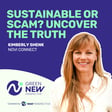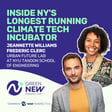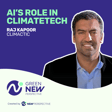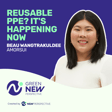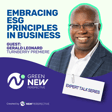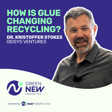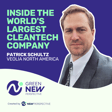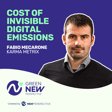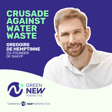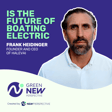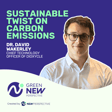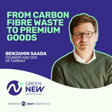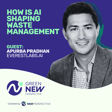Podcast Introduction with Melissa Pucella
00:00:06
Speaker
Hello, you're watching yet another episode of Green New Perspective, a podcast dedicated to sustainability. Join me in welcoming Melissa Pucella, the Vice President of Sustainability Solutions at WazeBets.
Innovative Waste Management Technologies
00:00:25
Speaker
Melissa has a 15 years of experience in the field of sustainability.
00:00:29
Speaker
And at WazeBits, they are revolutionizing waste management with innovative technologies and forward thinking solutions. So join me as I talk with Melissa about how we can properly manage our waste, whether we are companies or individuals.
00:00:54
Speaker
So hello Melissa and thank you for joining us here at Green New Perspective podcast where we highlight some wonderful individuals from the clean tech, biotech, nature tech space. We are lucky to have you here. I'm here you have a lot of things to share with us.
00:01:14
Speaker
Yes, of course. So for the start, I have to ask you the question that I'm asking all my guests on the podcast. So can you tell us more about what Wazebit does and why is the work of Wazebit important in the realm of sustainability?
Sustainability Insights from Melissa Pucella
00:01:30
Speaker
Awesome, thank you. And thank you for the opportunity to speak up for the waste industry. With waste bits, they've really paid attention. They're all veterans from the waste industry with over 30 years of experience. And they listened to the industry where there was difficulty. And they built a software as a service program that is allowing some transparency and tools for users all the way from haulers, waste brokers, waste facilities, and the companies that are generating the waste.
00:01:58
Speaker
They're providing a tool that helps them manage their waste and stay compliant, but also efficient in the workplace. In addition to that, they really offer an expertise to their customers that goes well beyond their software.
Environmental Impacts of Mishandling Waste
00:02:12
Speaker
How does waste, particularly the types covered by waste, negatively impacts the environment? Can you share with us some of your thoughts and experiences?
00:02:24
Speaker
Absolutely. I always simplify it. Waste comes in all formats. And I think when you look at what can be the most damaging to the environment, it's when it's handled the wrong way. So if you know what the waste is, and it's hazardous waste is probably the most prominent in the waste bit system because it's regulated waste. You have to report on it and it needs to be handled correctly.
00:02:48
Speaker
So if you think of examples that end up in the news, there's train derailments. There are spills that happen and that affects the community and not just the people handling that. And bringing that visibility to what the chemicals are and where it needs to go, what businesses are permitted to take it, we bring visibility and transparency to that. So we really see all levels of waste, whether it's hazardous or not, that's probably the most
00:03:16
Speaker
impact to the environment is when it's not handled correctly. And also as people are looking at their waste, they want to find reuse for it. So there's other ways to look at it, not just in a chemical or regulated waste standpoint. What's your personal opinion?
Addressing Public Confusion in Waste Management
00:03:34
Speaker
Do you feel that people know how to manage their waste? Has there not? Are they informed?
00:03:41
Speaker
You know, I think they're confused. I think it's complex, more complex than people think. I think when you put your trash, even if it's at your home, out of sight, out of mind, you don't really know where it goes after it leaves your place of business, your place of work, wherever you may be. And I think that's the misconception out there. So I feel like companies are now being forced to get more educated and more responsible about you are responsible for the waste you create, but also what you choose to do with it.
00:04:10
Speaker
And I enjoy regulations and mandates or initiatives for that reason because there's a trickle down effect because you are making them responsible for that information. So people are confused about where do I take it? How can I make that decision? And a lot of companies don't realize you might be crossing four state lines or countries to be able to process that waste.
00:04:36
Speaker
They didn't have to think about this before, and now it's very evident. It's getting more transparent out there, and we're helping do that. How WazeBit is working to mitigate the environmental impact?
Transparency in Waste Handling
00:04:50
Speaker
Absolutely. I think I'll bring up this word a lot and it is transparency. I think bringing the ability to see what waste is being handled and where it's going and how it's being disposed of, we're allowing companies a tool
00:05:07
Speaker
that is going to allow them to be much more involved in that process, but also for the haulers and the waste facilities. You could be at a landfill. It's not a bad thing, but what if they're getting waste that they're not even supposed to be permitted to handle? Everyone plays a part in the cycle. We're bringing visibility to that transaction, which is very new in the industry.
00:05:31
Speaker
And how are companies reacting? I'm really interested about it. Companies and people alike. Because like you said, it's a new thing. Yeah. I think everyone wants to do the right thing. I think so many companies are saying, you know, I want to recycle, I want to reuse. Recycling isn't always the option and or practical. And I think that's where the education really comes in.
Recycling Complexities and Education
00:05:56
Speaker
they should work and challenge their suppliers to get more educated. And companies are appreciating when you can have a conversation and give them options. So with waste bits, we're in that consulting arm as well and really helping them understand, let's actually look at your waste, but look at the business that you're doing and give them options, not just let's go recycle everything. Let's go waste to energy and everything.
00:06:24
Speaker
they need more information so they can make informed decisions. And I think the customers are stepping back and thinking, oh, this is way more complex than I imagined. And I think what they don't understand is every waste stream has a different plan.
00:06:40
Speaker
There is not one company that can handle all types of waste, and I think that's very new for users, and they're trying to figure out how to mitigate that. And can you discuss some of the key approaches or technologies utilized by the company, by waste bits?
Key Technologies for Waste Management
00:06:56
Speaker
Absolutely. It goes back to the identification of the waste stream itself. So you have to look at a site level to understand what are you using and what processes are happening while you're creating that waste. And I'll give the example. If you're interested in trying to get rid of certain waste but you're handling chemicals before it goes into waste, that needs to be handled differently than if you weren't.
00:07:21
Speaker
So it comes to learning what practices are going on in that location, what is the waste, and what are your initiatives at that time, and then that's where we can give them solutions. And waste fits has an ability to see these are the waste streams and these are the facilities that actually manage that waste.
00:07:41
Speaker
We can also see where those landfills are or look at history and do that. So this is within Waspit software on a few different modules, whether it's Waspit Insights, Waspit's Locator tool. These are all available to our end users. And you are the VP of Sustainability Solutions.
Melissa's Journey in Sustainability
00:08:01
Speaker
So what does your role entail?
00:08:05
Speaker
Yes, I spent 18 years in the industrial and global supply chain space. So I really brought to the company an evolution of what does that mean when customers think about sustainability or ESG goals?
00:08:16
Speaker
That's a new topic or buzzword you could say that's coming up. They've been doing this for years, but how do we evolve our software to communicate? What does that mean in emissions? What does that mean to the industry and ESG frameworks that our customers care about and have to report towards? So I'm working to evolve the software solutions to communicate at that level.
00:08:39
Speaker
So when you choose landfill or when you choose recycling, what does that actually mean from an emissions standpoint? And again, that allows people to make informed decisions, but also aggregate results because most companies, you're not going to have just one waste vendor. You're going to have 10, 15, 20 different ones sending different kinds of reports, different kinds of data.
00:09:02
Speaker
Our software allows them to aggregate that and really focus on what their business is supposed to be doing, not chasing waste reports. Yeah, and are there some specific standards or recommended practices that you follow?
Adhering to Sustainability Guidelines
00:09:17
Speaker
Yes, absolutely. If you look at the UN guidelines in addition to the CDP or the SASB and the GRI, those are all frameworks that we're following. And it tells you, it gives the roadmap. Scope 3 emissions comes up a lot, and that's very complex.
00:09:34
Speaker
And I'm really big on the fact that even if it doesn't get enforced or no matter when it does, there's customers that are already taking reporting to that level. And this is part of the end of life cycle that needs to be responded to. So waste needs to go beyond just the tonnage that's been dealt with. What about the commutes that are happening to process that waste? That's gonna enforce everyone getting to that level of detail. And that's where we're putting our focus when it comes to the data that we have.
00:10:03
Speaker
And how do you guys communicate your commitment to sustainability and environmental responsibility through marketing practices?
Educating the Industry on Waste Management
00:10:12
Speaker
Absolutely. We are really big on the education piece. Even if it's not least related, we are focused on whatever's going on in the industry that we know can add value. We are pumping education out there completely. We're also opening the lines of communication up, not just with our customers, but within the waste vendor space. We're finding out that there's companies that do really great work.
00:10:33
Speaker
not only within their own community, but they're trying to be a part of this circular economy and we're giving them a voice. We have a podcast, we have press releases. So we're really open about that. And I keep saying that we're trying to bridge the gap in the industry and connect the waste generators with the waste facilities and continue to educate and evolve together because it really does take everyone playing their part in this to make a difference.
00:11:00
Speaker
And have you seen some results, especially with the podcast? Because I mean, that's a format that is somehow approachable to a lot of people with different levels of knowledge. But when we talk about waste, I'd say that most people don't know much about it and how to manage it. So I think it's really, really cool that you guys are doing that kind of formats.
00:11:21
Speaker
Thank you. And I think we've opened up that opportunity to really highlight the other companies. It's not just about waste bits. We're a piece of the puzzle. And I agree. I think it's really opened it up. And we want to share cool stories because everyone needs to learn and educate each other of what worked. And if we stumble and fail,
00:11:39
Speaker
We're going to share that because maybe someone else could save those steps. It's a really fun process, and I got to see the other side from raw material to consumption on supply chain, and now I'm influencing things on the end of life cycle and continuing that. So the value chain that everyone's a part of, it's very intriguing and interesting to me, so there's a lot to talk about in our blogs.
00:12:04
Speaker
No, I love the transparency. Not a lot of companies want to admit that they've made some mistakes along the way. And I personally believe that's so, so important because we're all things are new. So of course we're going to make some mistakes. And like you said, people need to learn from them. That's so important.
Client Engagement Challenges
00:12:25
Speaker
I agree. I think it's great to learn as you step through those things and also evolve your practices. I'm always really big on not getting stuck in too many SOPs. Yes, they're there for a foundation of things, but you need to evolve. You need to pivot.
00:12:43
Speaker
As it's needed and I think that happens a lot in the waste industry They all work together and I got to witness that yesterday all day across multiple states and companies just putting Everyone pitched in to get the job done and it was a great thing to witness and does this approach helps the waste bits attract clients I mean I
00:13:07
Speaker
Yeah, it does. I think that's the biggest part is the fact that we're able and willing to have a conversation. We're way beyond invoice or a software bill. Like I said, the team really cares about their customers and within the industry is very open to connecting businesses. And that to me is what set waste bits apart. Can you tell me, are there any challenges that you face in this regard?
00:13:33
Speaker
Yes, absolutely. I think while you're doing that, sometimes you're out there and you share a ton of information and you spend time going back and forth. I think the biggest stumble is so many companies want to do the right thing. You spend a lot of time going back and forth and evaluating solutions for them, but then it could end up in a budget conversation. And maybe it's not time now and, or,
00:14:01
Speaker
The local people are not able to make a decision. So how are they supposed to make an impact? And we watch that happen. And it's not detrimental to waste bits. We just get to see it so often that people are really trying. But how do you do that? And how we've handled that struggle is, again, educating.
00:14:19
Speaker
You can't just look at an invoice and compare apples to apples on a cost limit. How much time did you save because you did that? Did you have one last haul this month? That actually saved you money. Help them identify some of the cost savings in the practice that you're evolving in addition to the sustainability goals you're helping them achieve.
00:14:40
Speaker
I want to hear your personal opinion about clean tech.
Clean Tech's Role in a Sustainable Future
00:14:44
Speaker
Do you think that clean tech is going to have an important role in building a sustainable future? Yeah, and again, it's because you're allowing and opening up to
00:14:55
Speaker
the community and really pushing that voice and seeing what companies are doing. I think that's really important. And I feel I've watched this topic for 15 of my 18 years. I was always supporting diversity, sustainability, green products. So I've really seen the ebbs and flows of what it means.
00:15:11
Speaker
It's a game changer right now. There's enforcement going on. There's people have to change, not just businesses. And we're going through that. So absolutely. And I think companies are going to need software and beyond the solutions to get this done in an efficient manner. And what is your personal vision of a more sustainable world? Since you've been working in this industry for a long time, I'm sure you have a lot to tell.
00:15:41
Speaker
Yeah, the circular economy clicks with me the most, and the reason being is it makes you look at everything in the value chain. Where are you sourcing products from? Is it nearshoring, offshoring? All of it plays a part in how people and companies manufacture goods, that plays a part.
00:16:01
Speaker
Are they making more sustainable products? Are they reducing consumption? There's so many elements of this. And I think if we look at everything versus trying to find this easy button to figure these things out, there just isn't one. Everyone has to be committed to that goal and understand that the minute you are, say landfill free. OK.
00:16:22
Speaker
but you're not done, like you're never done. You have to keep working towards that. So my opinion is just the evolution of it needs to be there so we can make better business decisions while trying to achieve it, but also see the big picture in the long-term goal that we're all really striving for.
00:16:41
Speaker
And where is Wizzbits in that scene? How can Wizzbits collaborate with other businesses, organizations, entities to achieve that goal? Yeah, I feel we bring a brand agnostic
00:16:57
Speaker
ability to the industry to say, what role do you play? Are you a waste generator? Are you a hauler? Are you a facility? Are you a waste broker? We have a home and a tool that serves those needs, and we are there to scale and grow with our customers. So I think the fact that we're not segmenting
00:17:16
Speaker
focusing on one waste stream or one type of industry. It really helps across the industry making impact. I think that's what sets waste bits apart. And as we even work with companies that might have preferred partners, we're going to elevate them as much as possible. But it's in that circular economy format of how do we connect each other and make sure we share as well. And how do you envision the company's impact in the long run?
WasteBits' Long-term Impact
00:17:46
Speaker
Yeah, I think it's really going to help with the transparency. I do think companies and tell force to be more transparent with data, especially around waste, especially when it's not regulated. As that changes, WasteBits is already seeing and investing time in getting there. They're not waiting for the regulation to be enforced. They're not waiting for another spill to happen. And the fact that we're already forging that way, we hope to help other companies catch up when it's time. So when do you think the regulations are going to come?
00:18:16
Speaker
They're already here. They're already here. If we look at something so simple as there's regulations at a city, state, county, province, border level that exist all day today on chemicals. The point is that regulations to the SEC is motivating companies to be public about their stance. But what I love about it, it's no longer I have a great marketing scheme. They need proof that you did what you said you're going to do.
00:18:43
Speaker
And that's the enforcement piece that's changing. And now it's beyond the SEC. There's regulations that are happening. And they're holding people accountable because there's plenty of laws and if they're not enforced, things just continue as they are. So I think that's the major shift that's happening. And we're just finding our place in it from the wayside.
00:19:05
Speaker
And for the end, I want to ask you, like, how do you feel that marketing has actually helped within this education?
Marketing in Sustainability Communication
00:19:11
Speaker
Yeah. Yeah. Yeah. Because you talk a lot of... Yeah. I mean, you... Go on. Sorry.
00:19:22
Speaker
I think we couldn't do it without marketing. We have the best marketing guy. His name is Ryan. He's amazing. He's committing all of his time to taking from not only the sales team, our CEO, every level of employment and taking that and sharing it with the industry. And we could not do it without podcasts or blogs or marketing. There's no way. And communication is key.
00:19:47
Speaker
You need to take something so complex and deliver it in a simple fashion for different levels of people. And I could not do that without our marketing team. So how do you guys convey those messages? How do you simplify them? Is that an easy task? No. And trust me, I'm the least simple when it comes to I will send them so much information and he just works his magic. I mean, he's using so many tools to be efficient with it.
00:20:14
Speaker
Um, but also he knows what the industry is looking for and we keep it punchy, just simple, short and sweet. Um, and I think that's where marketing and technology have a great play in the space today. Yes. Well, that's it. Um, I think that we can end here. Um, if you would like something to add, you feel, you'll feel free to do that. If we miss something.
00:20:40
Speaker
I think the biggest thing is I look forward to working with companies. WasteBits is not for everyone, but we are for the companies that are serious about taking their responsibility with waste serious. And we have the software tools and consulting ability to help you get there.
Episode Conclusion and Listener Engagement
00:21:02
Speaker
You are watching episode number 11 of Green New Perspective podcast featuring guest Melissa Bruchalla, vice president of sustainability solutions at WazeBits, as she shared her valuable insights on proper waste management through clean tech.
00:21:17
Speaker
To all of you, our listeners, we hope you found this episode of Green New Perspective top-provoking and inspiring, and if you have and if you have enjoyed this discussion, make sure to subscribe to our podcast for future episodes on innovative sustainability initiatives. We would love to hear from you, we would love to hear your thoughts and feedbacks, so please leave a comment or a review wherever you listen to your podcast. Your engagement and support are invaluable as we continue our mission to drive positive change.
00:21:47
Speaker
Join us next time as we explore more remarkable stories and groundbreaking ideas in the realm of sustainability. Bye.

